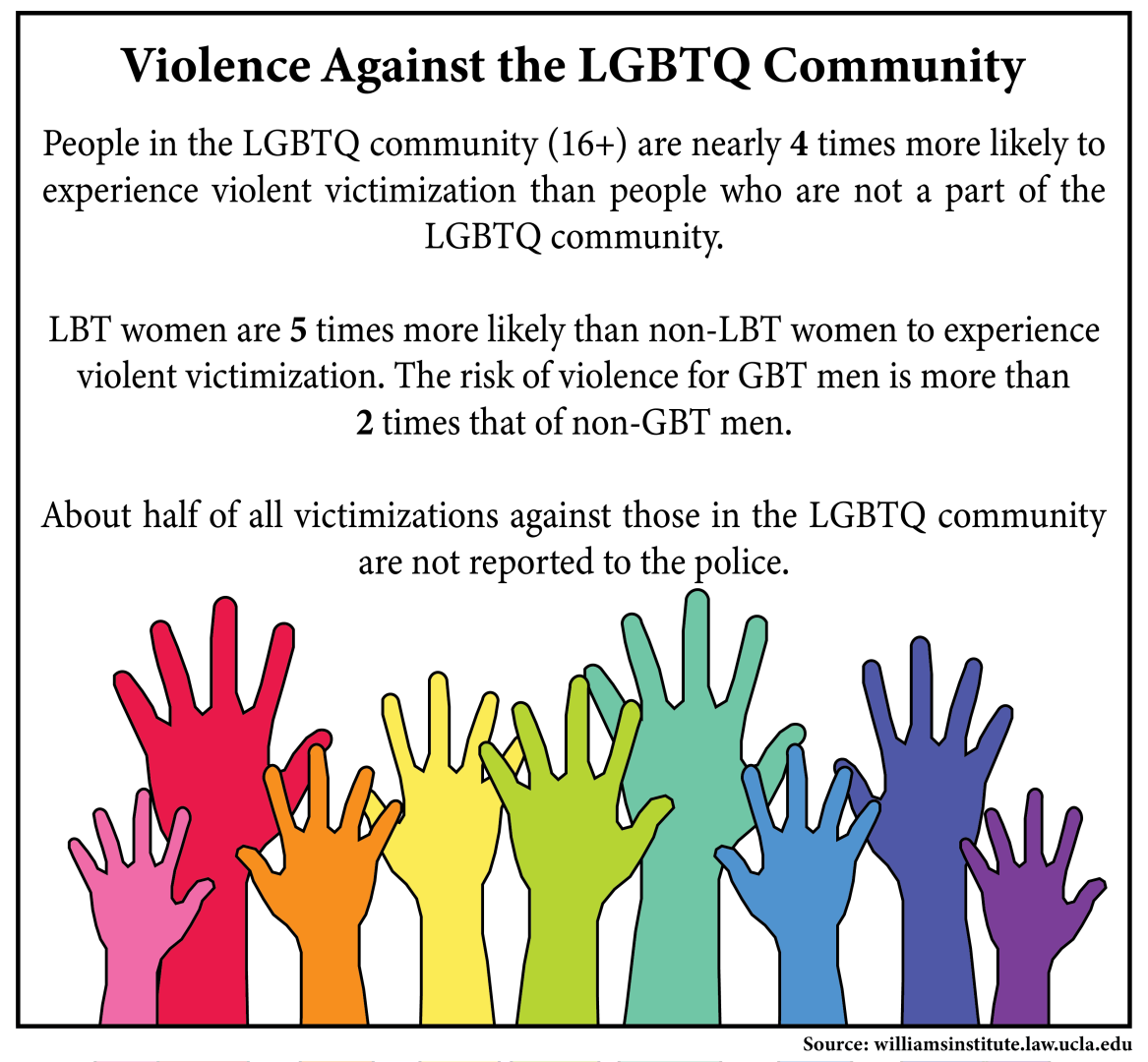On Nov. 19, a shooter went into the LGBTQ nightclub Club Q in Colorado Springs and opened fire, killing five and injuring 19, according to CNN. In 2014 (the most recent year for available data), 18.6% of reported hate crimes were committed on the basis of the victim’s sexual orientation and 1.8% were committed due to the victim’s gender identity, according to the Fenway Institute, an LGBTQ health center.
Hate crimes such as these can be sourced from the societal structures that individuals live in, the media individuals consume and personal bias, University of Indianapolis Assistant Professor of Sociology and Co-Director of the Community Research Center Elizabeth Ziff said. According to Ziff, gender roles also have much to do with hate crimes toward individuals of the LGBTQ community
“It’s important to look at the way that sort of overarching structures like patriarchy and religion has played a role in constructing people, either the non-binary sexuality or the non-binary genders, as somehow problematic, different, something to be feared, something to be seen as worrisome,” Ziff said.
According to Ziff, the nature of humans is one of fear, projection and suppression. The ability to hate and commit hate crimes is due to the dehumanization or political power leveraged against members of a community.
“It is relatively easy to hate, and especially when you see others as not equal or dehumanized in some way, shape, or form. I think it also speaks to the power of fear in people,” Ziff said. “I think it shows the negative side of humans, that we do have this capability, and that, arguably, there are lots of parts of society that are built upon these more negative or punishing parts of human nature.”
According to Associate Professor of Political Science and Co-Director of the University of Indianapolis Gender Center Laura Merrifield Wilson, a reason behind recent anti-LGBTQ legislation is due to the legislators themselves.
“Particularly with LGBTQ issues, gender rights and women’s issues—any of these issues—most state legislators are men,” Wilson said. “They’re white men, they’re older men, they tend to be well educated, and that’s not representative, necessarily, of the entire constituency.”

Wilson said it is essential that everyone recognizes that they are affected by politics, even if they are not directly involved.
“Everybody’s impacted by politics, regardless of whether or not they pay attention,” Wilson said. “There’s a special level of responsibility, and I think we all need to play and make sure, especially if views aren’t being heard, people know those experiences exist and matter.”
According to Assistant Professor in the Department of Communication, Director of the Forensics Speech and Debate Program, Basic Course Director and Co-Director of the UIndy Gender Center Stephanie Wideman, the UIndy Gender Center allows students to connect to resources that allow one to not only advocate, but help represent the LGBTQ community at UIndy and outside the university.
“The Gender Center [acts as] a resource hub for all things related to gender expansively,” Wideman said. “We’re a resource hub to make sure that we pull together to solve issues and to promote the way gender impacts all of us.”
Wideman said it is important for the Gender Center to be community and student-run, rather than have a board direct it.
“We want students to feel like this is a place that there’s ownership, that they have ownership over as well,” Wideman said. “We don’t want it to be faculty-based; we want it to be a community.”
According to Wilson, the Gender Center’s purpose is to cultivate and encourage conversations regarding sexuality and gender identity, as well as provide the opportunity for people to address any questions and fears students may see as important.
“There’s a role the center plays in engaging everyone in this kind of dialogue because we know everybody is impacted by issues of gender and sexual orientation, and we aim to be a centralized space that can help cultivate these kind of conversations,” Wilson said.
Director of the Center of Service Learning and Community Engagement and Adjunct Instructor for the Sociology Department Marianna Foulkrod said that both the Gender Center and student-led advocacy groups at UIndy are available for supporting LGBTQ students.
“Students can choose to give their time and energy in anything that they choose to, whether it’s direct service, indirect service, fundraising for a course, advocate, create policy change,” Foulkrod said. “[Students] have access to the Gender Center, the Center of Service Learning and Community Engagement and different academic areas of inclusion and equity.”
According to Foulkrod, the efforts of advocacy groups, clubs and organizations have a significant impact on local communities.
“The key is that you are matched with the entity, with the organization that can help move your vision forward, because it’s their vision, and that’s where we come in,” Foulkrod said. “It’s either curricular or co-curricular experiences where you can go in and at the same time, you’re expanding your network in a field that you are passionate about.”
For LGBTQ students looking for support at UIndy, the Rainbow Pack holds weekly meetings on Tuesdays at 11 a.m. in the Student Counseling Center.







